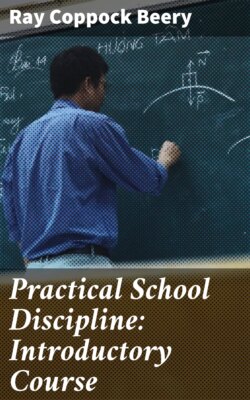Читать книгу Practical School Discipline: Introductory Course - Ray Coppock Beery - Страница 11
На сайте Литреса книга снята с продажи.
The Common Sense Factor
ОглавлениеTable of Contents
Some people tell us that teachers are born and not made, that tact is an innate quality. Of course, there is a certain amount of truth in this. It is needless to say that not all teachers can attain the same high degree of efficiency in controlling a school. But to say that a certain teacher can never succeed, because he does not have tact, is to express ignorance of the true nature of tact. Tact can not be entirely separated from knowledge. Tact and common sense increase in direct proportion to the advance of one’s knowledge.
One employs tact when he says and does the right thing at the right time and place. Tact implies skill in dealing with immediate circumstances. Therefore, the more experience one has in dealing with a given circumstance the more proficient he should become. The mind profits by experience. A wise teacher also profits by ideas. If someone relates a case of discipline to you in which tact was used, you can use the same idea in a similar circumstance and you will also be using tact.
For example, a certain teacher on entering a new school in the fall, learns that five or six of the larger boys have been talking on the street about whipping him out, in case he gets “cute.” If this teacher allows his pupils to find out in any way whatever that his mind is bothered about it; if he gets up before the school and attempts to make a speech calling attention to the gossip, he will thereby show very little tact and the offending pupils will most surely cause him more trouble.
On the other hand, suppose that, sometime when he is with the boys, without any evidence of anxiety, he incidentally remarks, “I see no need of trying to correct pupils by whipping them. People have nearly always treated me justly because I have dealt fairly with them.” This is using tact. The boys will not annoy this man; they will respect him.
So with hundreds of cases. Having each instance worked out in detail, the teacher may determine the minute application of good methods. In this way he can avoid harmful schemes and employ only tactful plans.
It is the ignorant teacher who is untactful; it is the wise and well-educated teacher who is tactful. By well-educated, here, is meant educated in proper discipline. A teacher may be a good scholar and yet be poorly trained in controlling a school.
The teacher who is well trained in matters of discipline does not look upon the many so-called puzzling circumstances as problems at all, because they so readily fit into his system of knowledge that he knows at once how to prevent prospective difficulties.
There will never be a day in which you will not use the ideas in this Course, consciously or unconsciously, in one way or another. The ideas presented are fundamental.
There is only one more thought the author wishes to leave with you in this Introductory Course before taking up the instructions in the regular Course. That is this: a child is influenced more by those teachers whom he likes and admires than by those whom he dislikes and who antagonize him. Therefore, it is hoped that each teacher will begin the reading of this Course with a strong conviction and a firm determination to gain from it a means of getting the child’s confidence, which will enable him to be a power for good in guiding young lives aright.
No teacher has attained the greatest joy in his profession until he has received from boys and girls letters of overflowing thanks for past helpfulness. And every teacher will realize this joy who conducts his school in a rational way and who learns methods by means of which he can place discipline upon the natural basis of confidence.
When you have learned the relation of your own conduct to discipline and the relation of your school to discipline; when you have come to realize the real province and true end of discipline; when you have completely learned the great fundamental and universal principles of discipline which work toward this ideal end and finally when you have learned to apply these principles to the dozens of concrete, typical cases with which you will always be confronted in the school-room, then you will be in possession of knowledge that will not only cause you to be sought for by school authorities, to teach in better schools at far better remuneration, but it will enable you to do infinitely more for boys and girls, thus making life itself better for yourself and others.
“What we need more than better brain inheritance is a better and more scientific set of rules for developing the brains that we have, and such rules of procedure should be made the common property of all who are in any way related to rearing and educating children.”[2]
2.McKeever, Psychologic Method in Teaching, p. 329.
Confidence
Confidence, that basis of control which is necessary in dealing with a youth who is physically too big to whip, is the best basis for dealing with a child or adult of any age.—R. C. B.
